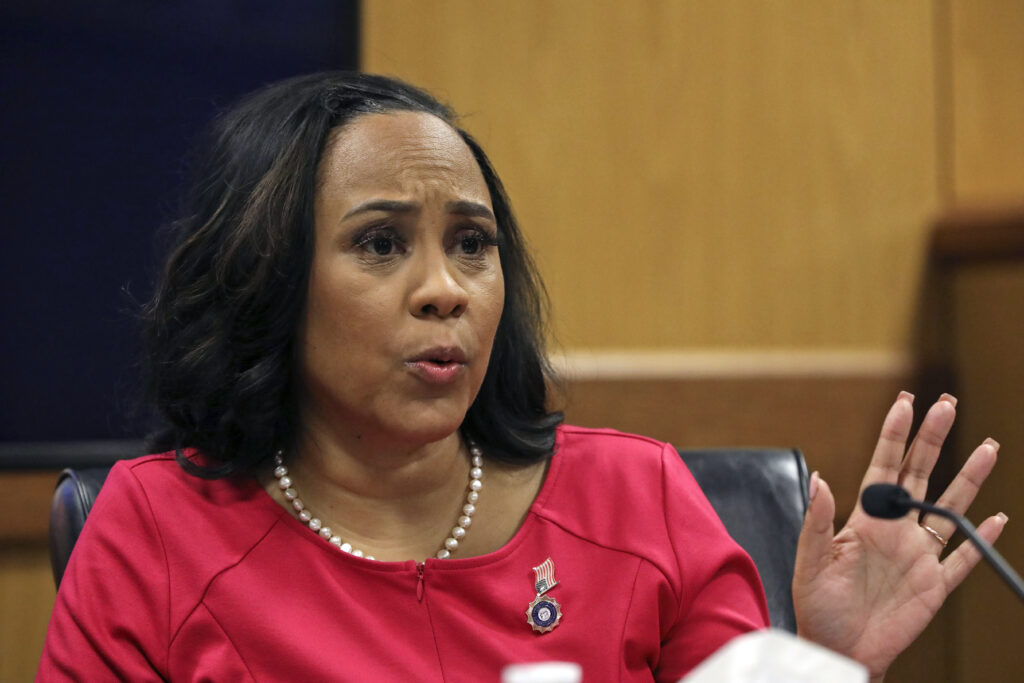Fani Willis’s Lover Appears To Have Visited Her Apartment Overnight, Exchanged 12,000 Texts With Her, All Before She Claims Romance Began
New evidence adduced by President Trump puts into sharp relief the question of whether the district attorney of Fulton County and her former boyfriend lied repeatedly — and under oath — about when their own affair began.

New evidence offered by President Trump, in the form of a vast data dump subpoenaed from AT&T, puts into sharp relief the question of whether District Attorney Fani Willis and her former boyfriend and special prosecutor, Nathan Wade, lied repeatedly — under oath — about when their relationship began.
The 45th president’s attorneys have accessed reams of Mr. Wade’s cellphone data, and a criminal defense investigator, Charles Mittelstadt, tallies “2000 voice calls and just under 12,000 text messages exchanged” between Mr. Wade and Ms. Willis over an 11-month period in 2021. The two deny that they were romantically involved during that time period.
Mr. Mittelstadt’s analysis also discloses that during that span there were a “minimum of 35 occasions when Mr. Wade’s phone connected for an extended period” to one of two cellular towers close to where Ms. Willis was living, at the condominium of a college friend, Robin Yeartie, at south Atlanta. Ms. Yeartie has testified that Ms. Willis is lying about when her affair began. Mr. Wade said on the stand that he visited Ms. Willis not more than 10 times.
The cellphone data appear to bolster the defendants’ contention that Ms. Willis and Mr. Wade are lying. On, say, September 11, 2021, Mr. Wade’s phone left his home and connected to the tower near Ms. Willis’s at 10:45 p.m. “The phone remained there,” Mr. Mittlestadt observes, “until September 12 at 3:28 a.m.” On another occasion, November 29, 2021, Mr. Wade received a call from Ms. Willis at 11:32 p.m. His phone connected to the tower near her home at 12:43 a.m., and “remained there until 4:55 a.m.”

Mr. Mittelstadt calls his report a “conservative analysis” and observes that a “deeper analysis of the data would reveal additional details” about Mr. Wade’s peregrinations during this crucial interlude. Anticipating likely efforts to challenge his conclusions, he notes that the “modality” of interpretation he applied eliminates the “possibility that hits could be associated with routine travel on either I-75 or I-85 or visits to nearby attractions or the airport.” Ms. Yeartie’s condo, in the Hapeville neighborhood, is close to the airport.
The investigator explains that a hallmark of his approach is the “inability to manipulate the data. Data is uploaded as received by the cell provider custodian” and then can be “queried and examined in innumerable ways. From there, data reports can be generated using filters, and the geolocation data can be displayed in unlimited ways, including via an animated map.”
Underscoring the stakes of what Mr. Mittelstadt relates, his report declares that “I report under penalty of perjury that the foregoing is true and correct.” He affirms that the tool he used, called “CellHawk,” is “considered by law enforcement to be the gold standard in cellphone records analytics.”
The records amount to a supplemental defense exhibit and add to the case for the disqualifications of Ms. Willis and Mr. Wade brought by a number of criminal defendants in the district attorney’s racketeering case, among them Mr. Trump. They alleged a conflict of interest stemming from the romantic and financial entanglements between Ms. Willis and her handpicked special prosecutor.

The core of the dispute between the defendants and the district attorney’s office — and why these records could prove helpful to the defendants — is when the “personal relationship” began between Ms. Willis and Mr. Wade. The prosecutors assert that romance was only kindled after Mr. Wade was hired in 2022. Before that, they assert, the association, which began in 2019, was platonic. Ms. Willis lauds Mr. Wade’s credentials as “impeccable.”
The defendants, though, point to a romantic anniversary that predates Mr. Wade’s appointment, and suggest that his most significant qualification for the job — he has never before prosecuted a felony case, or a racketeering one — was his relationship with Ms. Willis. Once on the payroll, Mr. Trump et al. contend, the more than $650,000 paid to Mr. Wade funded vacations the pair took together. Ms. Willis contends she paid her own way, in cash.
Judge McAfee on Friday ordered that a hearing, to be held on March 1, will be devoted to the question of whether Mr. Wade and Ms. Willis should be disqualified. Last week, two sessions in open court were devoted to the same issue.
The judge heard from, among others, Ms. Willis, her father, Mr. Wade, and another lawyer, Terrence Bradley, whom the defendants believe can attest to an earlier start date for the relationship. Mr. Bradley, though, invoked attorney-client privilege to avoid sharing what he knows.
A spokesman for Ms. Willis, Jeff DiSantis, declared in a statement that “we are required to respond to the filing via the court and we are preparing a response now.” It will be up to the presiding judge, Scott McAfee, whether to enter Mr. Mittelstadt’s affidavit into evidence. A request for comment was left at Mr. Wade’s law firm.

